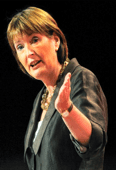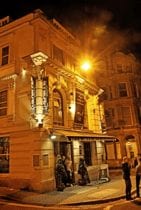
The 2009 act
Until Labour in the dying days of it’s miss rule changed the law strip/lap dancing clubs did not require a special license beyond that of other late night venues serving alcohol. Generally licenses were granted and only taken away if a venue created lots of trouble for the police or caused noise and disturbance to local residents. All statistics said that strip venues created far less problems than conventional clubs and pubs so therefore run ins with the council were quite rare and very few clubs were either turned down for a license or had a license removed once it had been granted. London Gossip November 2009
This happy situation however did not meet with the approval of a coven of fem Nazis within the Labour government headed by Ayatollah Harperson {left} deputy leader of the party and including the likes of “expenses fiddler” Smith the Home Secretary as well as woman only shortlist nonentities looking for a cause like Cliar Barlow and Roberta Blackman-Woods. Their stated aim was to give local communities “more say” on the sex trade but privately they decreed that the aim of the act was to close down well run clubs which did not break the law and were thus impossible to close using the old act. The act was passed in 2009 but as is the way of these things it did not really come into effect until the middle of 2011, we have had it now for over 18 months and it’s time to look at the actual impact.
The new law specifically excluded Grandfather rights {conflicting with European law} and stated that a council could set a limit to the number of clubs in it’s area and the limit could be “nil” {meaning all existing clubs would have to close down} and to make sure this stuck it could not be appealed in the normal fashion in court. The proposals were sent to local councils and were said to have “overwhelming support” even though over 75% of councils were so interested in the issue that they did not bother to reply. The response of the various strip clubs was pretty lamentable, an organisation called the Lap Dance Association was formed but only a small percentage of UK clubs joined {mainly the larger chains} and attempts to stop or at least modify the worst aspects of this nonsense were unsuccessful. It seems most clubs adopted the attitude that “somebody else can pick up costs” and “ lets hope it all blows over”. The move to close clubs on the other hand involved a number of partly publically funded pressure groups like UK Feminista, Lillith, Object etc who were also very active in lobbying councils. London Gossip October 2009
The use of the “nil” policy was the thermo nuclear deterrent of this act as it could only be appealed via a judicial revue which is a very expensive legal process normally involving highly paid QCs. If a council adopts a “nil” policy then it can turn down any applications to open new clubs and the new club is then faced with either giving up and trying somewhere else or committing to a very expensive legal process.
While adoption of the act by councils was voluntary the local feminists put enough pressure on local councillors to ensure that most but not all councils have adopted this legislation. A number of councils like Haringey in London, Chiltern, and St Albans introduced a “nil” policy where no clubs existed but more controversially places like Hackney, Portsmouth, and Tower Hamlets proposed a “nil” policy which would have involved closing down several long established businesses.
The anti strip brigade apart from pedalling dodgy statistics and invented anecdotes constantly  emphasised the “fact” that the majority of local people don’t want strip venues but in reality this has not so far proved to have been true. Where public consultations have taken place in areas with existing club that have attracted a decent response they have gone overwhelmingly against a “nil” policy. For example in Hackney they got 2,700 responses of which 67% were against a “nil” policy, Portsmouth got 3,425 of which 96% were against a ban, and Tower Hamlets apparently got 6,000 responses which must also have been against a ban they wanted as it’s over 12 months since the survey now and they still have not announced the results. The objections to the “nil” policy have also been expressed by locals in the forms of comments added to newspaper articles which tend to outnumber pro ban posts 4 or 5 to 1.
emphasised the “fact” that the majority of local people don’t want strip venues but in reality this has not so far proved to have been true. Where public consultations have taken place in areas with existing club that have attracted a decent response they have gone overwhelmingly against a “nil” policy. For example in Hackney they got 2,700 responses of which 67% were against a “nil” policy, Portsmouth got 3,425 of which 96% were against a ban, and Tower Hamlets apparently got 6,000 responses which must also have been against a ban they wanted as it’s over 12 months since the survey now and they still have not announced the results. The objections to the “nil” policy have also been expressed by locals in the forms of comments added to newspaper articles which tend to outnumber pro ban posts 4 or 5 to 1.
 The lack of public support though has not stopped some councils going ahead anyway, in Oxford “The Lodge” {left}the cities only club having already moved once to keep the council happy got more support than objections and a clean bill of health from local Police but the council still opted to close it down. This club is going to judicial revue and remains open in the meantime, if they win their legal challenge {which seems very likely} then council tax payers will be left with a totally pointless hefty bill.
The lack of public support though has not stopped some councils going ahead anyway, in Oxford “The Lodge” {left}the cities only club having already moved once to keep the council happy got more support than objections and a clean bill of health from local Police but the council still opted to close it down. This club is going to judicial revue and remains open in the meantime, if they win their legal challenge {which seems very likely} then council tax payers will be left with a totally pointless hefty bill.
You can also set a limit at above “nil” but below the number of the clubs that already exist, 2 councils that have done this are Leicester and Bristol. In Leicester they granted SEVs to 2 clubs but refused it to 3 others, one of the others “Angels” appealed this decision {on the ludicrous grounds that a new University sports centre was near!}and in November 2012 they won a judicial revue and were granted an SEV. In Bristol the council originally set a limit of 2 clubs {there were 4} but eventually granted 3 SEVs refusing only 1 club “lounge@30” {right}which looks like holding the dubious honour of being the first club closed down purely due to the new act. There have been other clubs in places like Twickenham and Henley that have lost licenses but they were in trouble before the new act came into force. Recently US giant Spearmint Rhino has stated that it wants to open a new club in Bristol , it is confident of using it’s legal muscle to overcome any council opposition and so would blow further holes in the original limit. London Gossip September 2009
Most cities which have a large number of clubs {eg Birmingham, Leeds, Liverpool} have actually given all existing clubs licenses and set no particular limit. In many areas of England {eg Accrington, Southport, Sunderland, Ampthill etc etc} first clubs have continued to open despite some local opposition and the new laws. The new law has been used in a couple of places {notably Newquay where I expect a legal challenge} to stop additional clubs opening but a lot of council legal departments have taken the view that if you exclude morals and taste grounds {which you must} there is still nothing in the new act to prevent new people opening a legal business in most parts of your area and so they will lose any court case.
One area where there has undoubtedly been an effect is actual level of the license fee. Most councils  adopting the new laws have taken the opportunity to increase the license fee 10 fold or more, across the country there are also considerable variations. The cheapest I have heard of is Cambridge at £775 the most expensive Hammersmith at £17,000 which is quite a variation considering it’s due to a national law !
adopting the new laws have taken the opportunity to increase the license fee 10 fold or more, across the country there are also considerable variations. The cheapest I have heard of is Cambridge at £775 the most expensive Hammersmith at £17,000 which is quite a variation considering it’s due to a national law !
Considering it’s been working for over 18 months now I’d imagine Harperson is rather disappointed with the results. Clubs have opened and closed as before for normal business reasons but “lounge@30” hardly represents the sort of high profile victim she and her coven were looking for initially!
In summary then I’d say the act seems to have had 3 effects to date,
1} It’s made the license more expensive.
2} It’s provided a lot more work for lawyers specialising in licensing.
3} It’s given an advantage to chains with large resources over sole operators when it comes to opening new clubs in areas with recalcitrant councils.
Tyke
Author: Saxon
Strip-magazine.com is covering the European Striptease industry with monthly updates on or famous London Gossip, Interviews with industry people, articles and news from the world of striptease. We also offer a Striptalk forum, Industry Directory with Stripclubs and Agents and a Job board for the Striptease industry in Europe.

